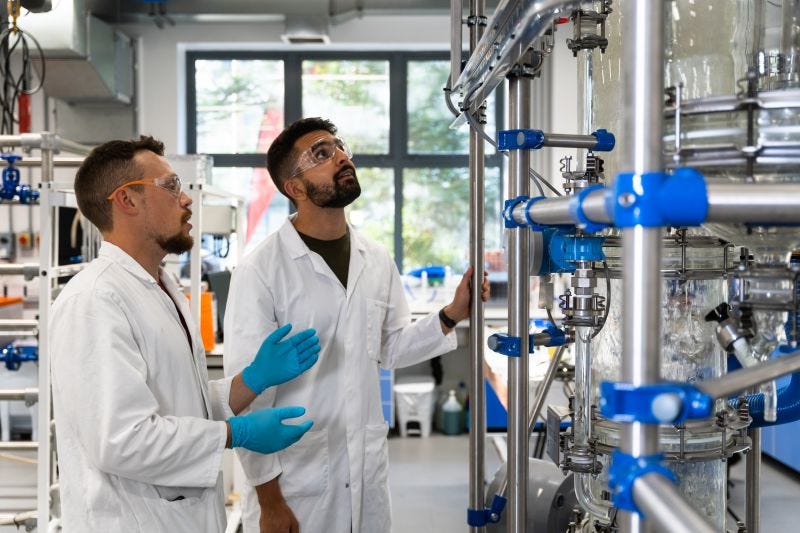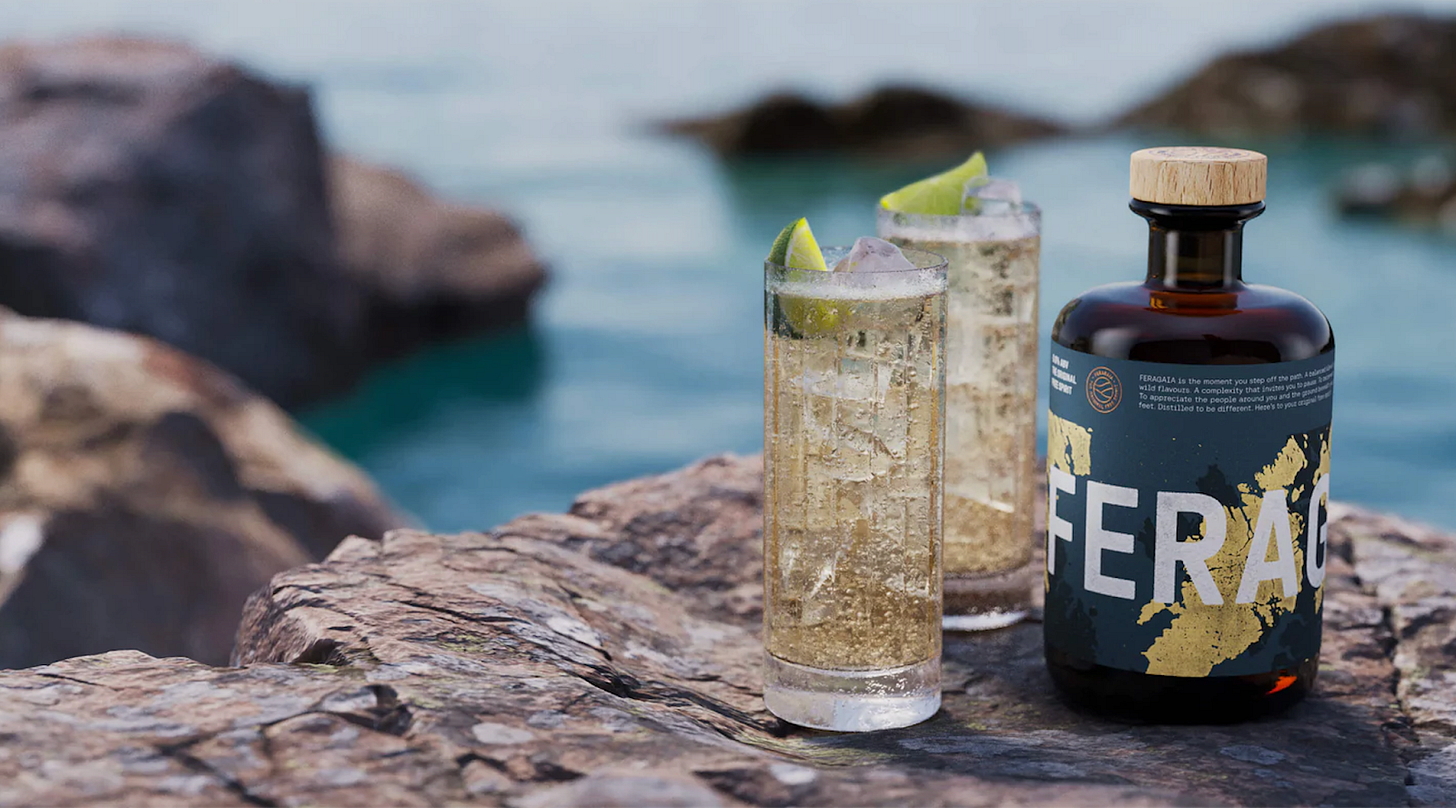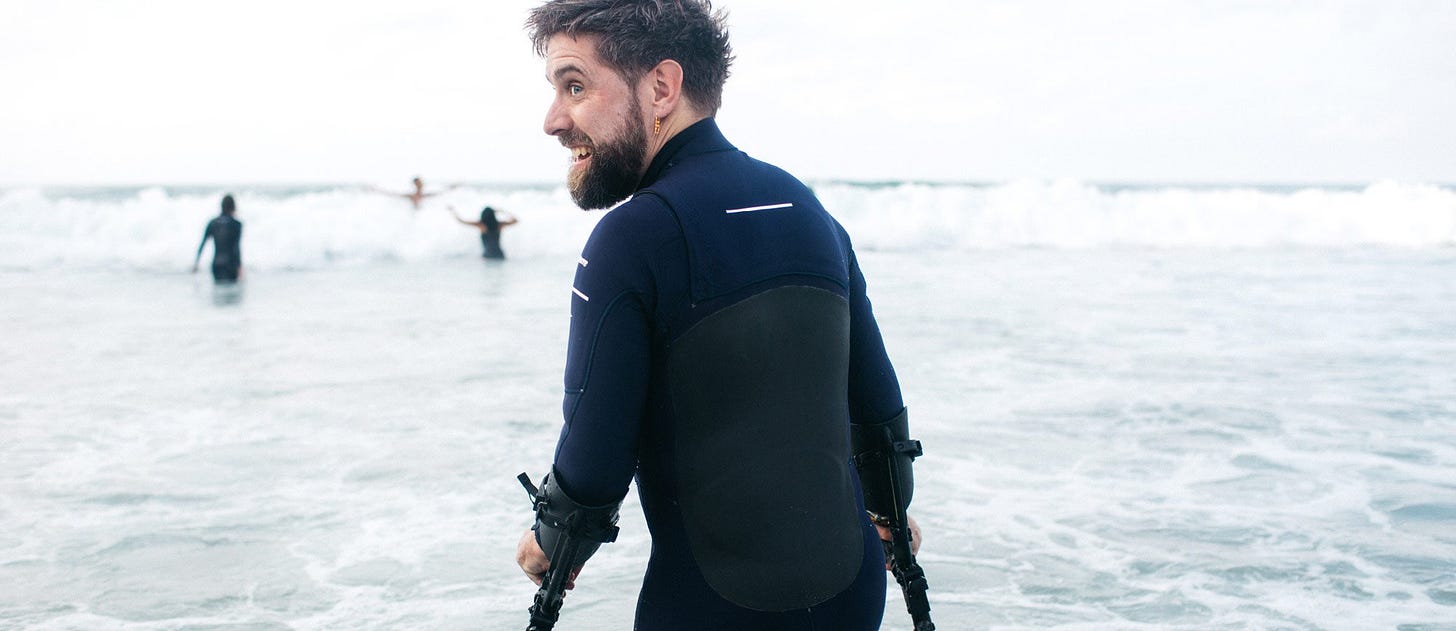🌱 All things algae, and how Feragaia are cultivating change at their Scottish distillery.
Featuring Kelpi, Notpla, Sipsmith, Refilled, Better Nature Tempeh and more...
Happy Monday!
This week we cover:
Quick Take: Innovation in Bloom: Could algae be seaweeding change across the industry?
Brand Spotlight: Diving into Feragaia’s environmental strategy, one local mitigation measure at a time.
In case you missed it: 🌱 How to turn Black Friday blue. Featuring Finisterre, SME Climate Hub, Dr Will's, Impossible Foods and more...
Before we dive in, a quick note from the FTF team! We’re buzzing behind the scenes, coming together as a team to plan how we can have an even bigger impact on the work that you - the people within FMCG brands who care about sustainability - do. Whilst we do this, we’re reducing the frequency of these newsletters to once every two weeks. We’re confident you’ll love the changes you’ll see from us over the coming months. In the meantime, thank you for your patience.
> Good News From The Last Two Weeks
🎯 Kaffe Bueno introduced the world’s first coffee biorefinery in Denmark. This is to support their aim to diminish the significant CO2 emissions derived from brewing 3 billion cups of coffee daily across the globe, by having more capacity to upcycle 500 tonnes of coffee grounds annually.
🎯 When in Rome and Better Nature Tempeh announced they are both B Corp certified, with Better Nature Tempeh achieving a score of 99.7.
🎯 Too Good to Go, partnering with Costa Coffee, announced that they have successfully prevented more than two million Surprise Bags of food from going to waste. The emission saved from removing surplus food from going to waste is equivalent to 984 flights around the world.
🎯 Refilled announced that their BYO-bottle soft-drink refilling stations, Refillers, will be used at the Someday Soon music festival in collaboration with the University of Sydney Union. The Sydney-based start-up aims to reduce single-use plastic bottles from vending machines by creating refill stations which offer chilled still and sparkling flavoured drinks.
⭐️ Waitrose announced they will be using biomethane from cow manure to power their tractors at their Leckford Estate Farm in a new project. A biomethane storage plant on the estate will store and harvest the methane, saving Waitrose 1300 tonnes of carbon annually.
⭐️ Sipsmith introduced their newly redesigned bottle which uses up to 44% recycled content and weighs 20% less than previous bottle, reducing their carbon footprint. They are also removing their wax-dripped lid, saving 7 tons of single-use plastic per year.
⭐️ Bacardi announced that they are opening a new Combined Heat & Power (CHP) system in Puerto Rico that aims to halve the greenhouse gas emissions of its Bacardi rum brand. The 50% reduction in Bacardi rum’s GHG emissions is a significant step in thier broader global sustainability programme, which includes a commitment to achieving a 50% reduction in GHG emissions globally across the entire business by 2025.
⚡ City to Sea announced their partnership with Marks and Spencer, Ecover and Reposit to reduce single use packaging items. The collaboration allows consumers to purchase goods in returnable packaging, in exchange for a deposit, before the packaging is collected, washed, sanitised and refilled. This project comes after an initial trial in six M&S stores, which saw great success.
⚡ Sustainable Apparel Coalition (SAC), an alliance for over 280 retailers, brands, manufacturers and stakeholders, launched the Manufacturer Climate Action Program (MCAP) as a critical component of its Decarbonisation Program. This is designed to catalyse support and drive the sector towards ambitious CO2 emission reductions. MCAP’s mission is to enable manufacturers to start their decarbonisation journey by providing an intermediate pathway for them to measure carbon emissions and develop science-aligned targets for Scope 1 and 2.
📆 Toast are hosting an event at their Good Company Taproom on Thursday 9th November to ‘Raise a Toast to Planet Earth’. RSVP here.
> Click on each link to read more.
> Quick Take
Innovation in Bloom: Could algae be seaweeding change across the industry?
Algae, the often-underestimated champions of sustainability, have quietly reshaped the FMCG sector. Seaweed and kelp, specific types of algae, have become essential players in the industry, finding their way into a variety of products ranging from packaging to natural pigments and food additives.
Algae’s Carbon Sequestration Abilities
These unassuming organisms have proven to be remarkably adaptable, fuelling innovation across FMCG. In fact, a study found that between 2015 and 2019, over 13,000 food and beverage items globally contained algae in some form. Beyond their practical applications, including food additives and natural pigment producers, algae possesses carbon sequestration properties, absorbing carbon dioxide from the environment.
Two noteworthy examples of algae revolutionising packaging are coming from brands Notpla and Kelpi. Notpla, a pioneering company, has developed biodegradable packaging made from algae, which has been used by major events and retailers like the 2019 London Marathon and by Just Eat Takeaway. Their innovative approach has garnered widespread attention, winning the 2022 Earthshot Prize for the ‘Build A Waste-Free World’ category. Similarly, Kelpi is utilizing seaweed to create biopolymers that make bioplastics compostable. They have also been recognised for their work, as one of eight finalists of the Tom Ford Plastic Innovation Prize. As winners of this prize, their materials will be used by global fashion brands.
Alternative algae uses across the sector
Another way algae is changing the current food carbon footprint landscape is by replacing traditional cattle feedstock. By incorporating algae into livestock diets, methane emissions, a major livestock-related emissions contributor, has the potential to be significantly reduced. The influence of algae doesn’t stop there. Companies like Keel Labs and Algaeing use algae to create textiles for the fashion industry. This innovative approach reduces our reliance on traditional textile materials and contributes to the biodegradability of garments.
Seaweeding Change
Often overlooked, these unassuming organisms have ushered in a new era of eco-friendly practices. Their versatility, from biodegradable packaging to eco-friendly textiles, showcases their huge potential. With innovative companies leading the way and researchers pushing boundaries, algae could transform the industry one product at a time.

> Brand Spotlight
Diving into Feragaia’s environmental strategy, one local mitigation measure at a time.
Feragaia is on a mission to transform the landscape of alcohol-free drinking, with an unwavering commitment to transparency and quality. The name “Feragaia” itself speaks volumes, translating into “land” and “earth” in Latin and Greek. It reflects the brand’s deep-rooted connection to the natural world and its resolute commitment to sustainable practices. Let’s dive into how the B Corp certified brand is stirring the perfect blend between growth and sustainability in a fiercely competitive beverage landscape...
Built on purpose
During the early stages of a startup, resources are limited. Finding smart, strategic workarounds is essential for success. The B Corp process was no exception for Feragaia. In lieu of a “Sustainability advisor”, Feragaia used the B Corp certification as a blueprint for purpose-driven development, anchoring their business model on B Corp’s five key impact pillars.
Top tip from Feragaia themselves: Use the publicly available B Corp principles to guide your early efforts. Despite only being able to apply to B Corp after one year of operating, you can use the publicly available principles to guide your early efforts. This makes certification easier when the time comes.
Prioritising strategic bets
In the early stages, every penny redirected away from conventional growth trajectories must be judiciously spent. Feragaia made strategic sustainability investments, drawing direction from financial models, customer surveys and impact forecasting to maximise investments. Key initiatives include:
Closed loop system: Feragaia’s distillation process adopts a closed-loop system. Byproducts from the distillation process are composted on site.
Packaging: The brand prioritises environmentally friendly material, using FSC- certified packaging materials and 100% recycled glass bottles.
Strategic partnerships: Championing partnerships with organisations that enhance their ‘Wild Earth” narrative e.g., the seaweed farm Atlantic Mariculture, Seawilding and Wild Land. Feragaia has since relocated their seaweed sourcing (a vital component to their distinctive flavour) to Atlantic Mariculture, cutting value chain emissions.
Local sourcing: Close to all ingredients are procured within a 75 mile radius of their Scottish distillery (Scotland’s first), reducing their carbon footprint and enhancing product quality.
Local matters
Localising your supply chain is no mean feat. It involves a far deeper understanding (vs outsourcing your supply chain) to master it whilst also requiring upfront investment (in terms of time and money). You therefore have to make sure that the investments will pay off. Ask yourself - is this important for your financials and/or brand narrative? However, it has brought substantial benefits:
Brand narrative: It has become a compelling cornerstone of Feragaia’s story, with a new income stream developing from drink enthusiasts visiting the distillery.
Less exposure: Greater control gained over their supply chain mitigates against price fluctuations and geopolitical supply chain risks.
Easier innovation: More personalised contact with suppliers and processes makes it easier to pilot projects to improve efficiencies, reduce impact etc. It also strengthens supplier relationships which makes data exchange much easier.
Positive impact: Decreased transportation requirements cut emissions (relocating production reduced road miles from 170 to 14 miles). There are also more opportunities for community investment e.g. 3 local jobs supported with farmers and foragers to harvest the ingredients.
Budgeting for Sustainability
Aligning sustainability with marketing and communications has yielded positive returns, as consumers increasingly favour brands with a sustainability core. Feragaia’s initiatives like "Wrack Friday'' exemplify this approach, where they redirected marketing resources that would normally be spent to push Black Friday sales towards seaweed cultivation off the West Coast of Scotland. This was a commercial and environmental win for Feragaia. It not only marked their biggest sales day in their first year, but also contributed 9200 native oysters and 920 seagrass pouches to the Sea Wilding cause.
In an era where conscious consumerism is on the rise, Feragaia's commitment to purpose, transparency, and localisation not only sets them apart but also provides a shining example for businesses of all sizes to embrace the spirit of "local matters". What we’ve covered today is only a drop in the ocean of all the hard work Feragaia is doing to be environmentally responsible - read a comprehensive list of actions here, and check out their impact report, too.
Take a closer look at Feragaia:

> In case you missed it
🌱 How to turn Black Friday blue
Featuring Finisterre, SME Climate Hub, Dr Will's, Impossible Foods and more...
> Follow up with…
Article: Can growers adapt to climate change?
Event: Carbonwise Drinks & Networking in London - 18th October
Event: SME Climate Action Series: A GHG Primer - 24th October
👉 Pssst - want to be featured in our ‘Meet the Partners’ series? Reach out here!






